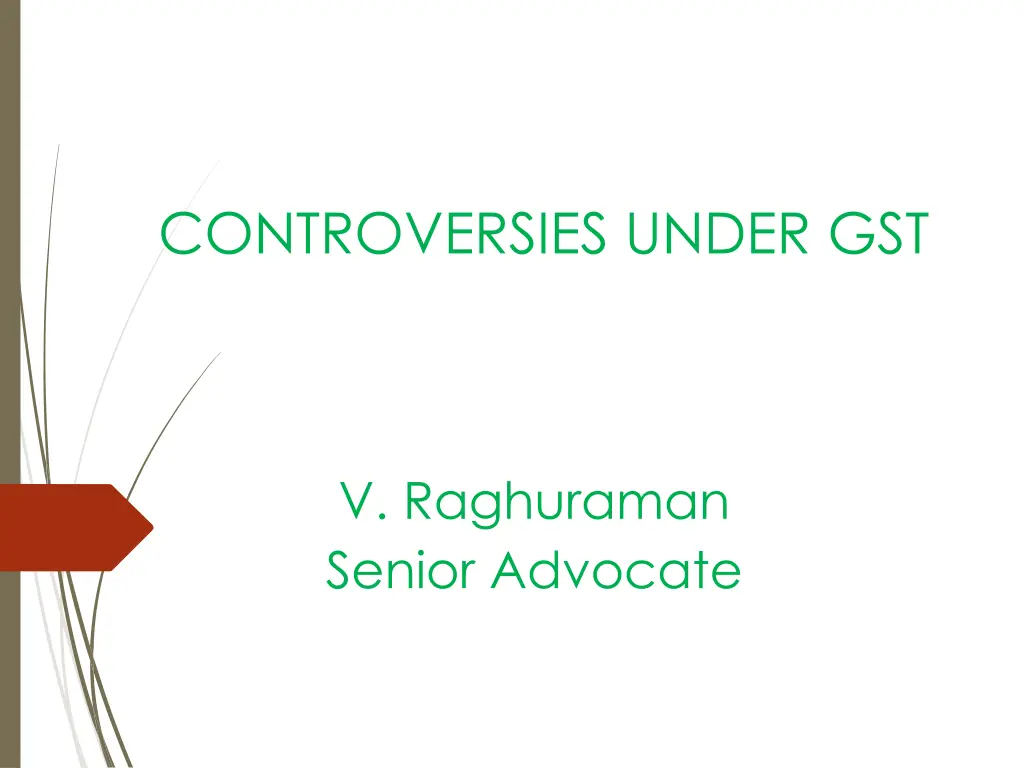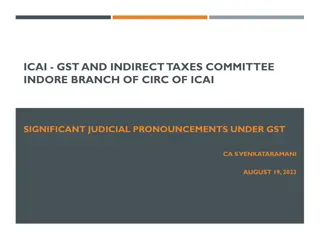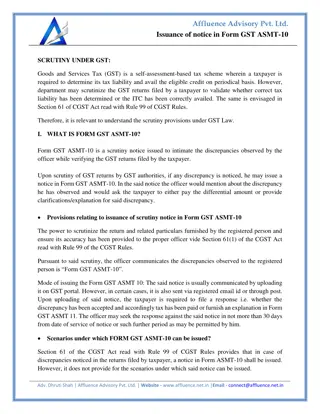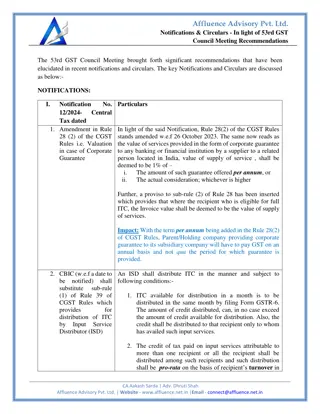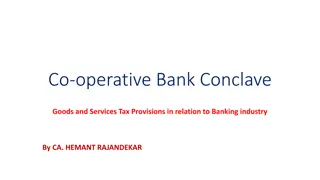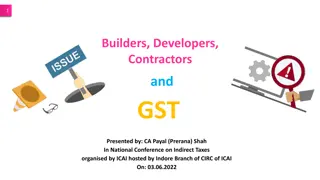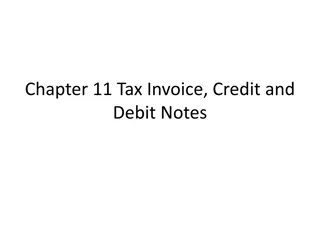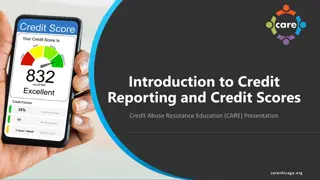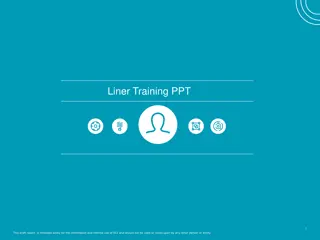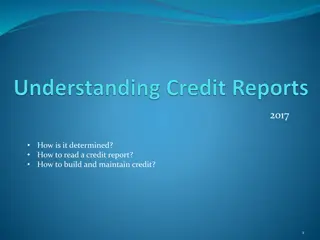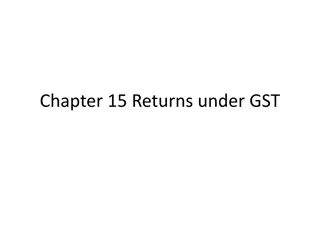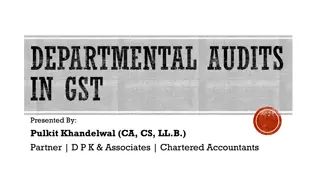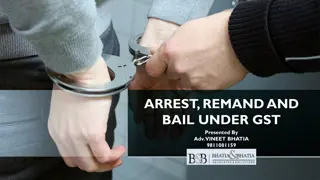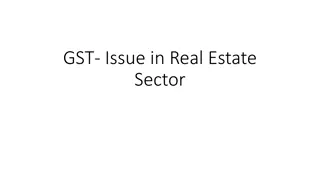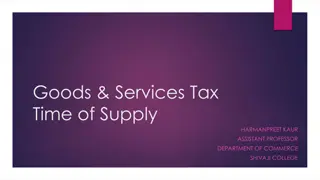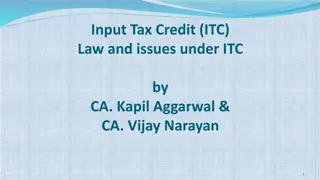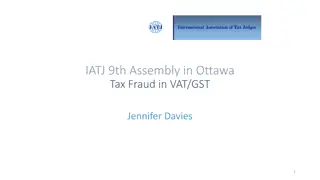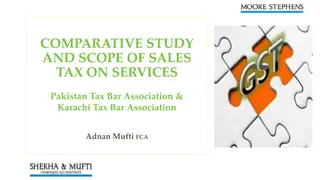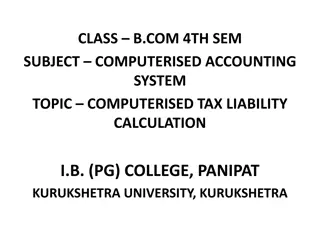GST Controversies and Input Tax Credit Issues
Explore controversies under GST related to input tax credit issues. Learn about recent cases involving reversal of credits, buyer responsibilities, and legal implications for buyers and sellers. Understand the complexities of availing input tax credits under GST.
Download Presentation

Please find below an Image/Link to download the presentation.
The content on the website is provided AS IS for your information and personal use only. It may not be sold, licensed, or shared on other websites without obtaining consent from the author. Download presentation by click this link. If you encounter any issues during the download, it is possible that the publisher has removed the file from their server.
E N D
Presentation Transcript
CONTROVERSIES UNDER GST V. Raghuraman Senior Advocate
2 ISSUES UNDER INPUT TAX CREDIT
3 AVAILEMENT/ REVERSAL OF CREDIT
SUNCRAFT ENERGY (P) LTD vs ASST. COMMNR [2023 153 taxmann.com 81 (CAL)] 4 ISSUE: Non-reflection of supplier s invoice in GSTR 2A - require reversal of input tax credit by the buyer ? HELD: Press release dated 18.10.2018 clarifies that GSTR-2A is for taxpayer facilitation and does not impact the ability of the taxpayer to avail ITC on self-assessment basis. The department without resorting to any action against the supplier, who is the selling dealer, demand cannot be raised on the buyer.
SUNCRAFT ENERGY (P) LTD vs ASST. COMMNR [2023 153 taxmann.com 81 (CAL)] 5 The tax invoices and the bank statement produced by the buyer to substantiate that price of goods and taxes have been paid to be considered. It was directed to first proceed against the seller and only in exceptional circumstances as clarified by Board, then and only then action can be initiated against seller. SLP has been dismissed by the Hon ble Supreme Court [2023 (157) taxmann.com (352) SC]
Aastha Enterprises vs State of Bihar [2023 (153) TAXMANN.COM 491 (Patna)] 6 ISSUE: Whether the purchasing dealer can be denied input tax credit when selling dealer, who defaulted payment of collected tax to the State? HELD: The benefit of claiming credit is one conferred by Statute - if conditions prescribed therein are not complied; no benefit flows to the claimant. The question of double taxation does not arise - since the claim is denied only when the supplier who collected tax from the purchaser fails to pay it to the Government.
Aastha Enterprises vs State of Bihar [2023 (153) TAXMANN.COM 491 (Patna)] HELD: 7 Statue has a measure to recover collected tax from the seller it does not absolve the liability of the taxpayer to satisfy the entire liability to the Government. The word 'Input Tax Credit postulates a situation where the purchasing dealer has a credit in the ledger account maintained by it with the Government. The said credit can only arise when the supplier pays up the tax collected from the purchaser. Accordingly, credit was denied to the purchasing dealer.
STATE OF KARNATAKA vs ECOM GILL COFFEE TRADING P LTD [2023 (4) CENTAX 223 (SC)] 8 ISSUE: Burden of proof in respect of genuineness of purchases for availing credit. The respondents had claimed credit on alleged purchases made from the respective dealers. The Tribunal and High Court allowed the credit, by observing that as the purchasing dealers produced the invoices issued by the respective dealers and in some cases, made the payment through cheques, the Assessing Officer was not justified in denying the credit. HELD: Mere claim by dealer that he is a bona fide purchaser is not enough and sufficient to claim credit.
STATE OF KARNATAKA vs ECOM GILL COFFEE TRADING P LTD [2023 (4) CENTAX 223 (SC)] 9 Burden of proving the correctness of credit remains upon the dealer claiming such credit. Such a burden of proof cannot get shifted on the revenue. Mere production of the invoices or the payment made by cheques is not enough and cannot be said to be discharging the burden of proof cast under section 70 of the KVAT Act. Purchase transaction was required to be proved by furnishing details viz. name and address of selling dealer, details of vehicle which had delivered goods, payment of freight charges, acknowledgement of taking delivery of goods etc. Actual physical movement of the goods is the sine qua non for claiming credit.
Malik traders VS state of up [2023 155 taxmann.com 517 (All)] 10 ISSUE: SCN was issued for wrong availment of ITC by the Petitioner. HELD: Petitioner has brought on record - tax invoices, e-way bills, GR and payment through banking channel, but no such details such as payment of freight charges, acknowledgement of taking delivery of goods, toll receipts and payment thereof has been provided. In the absence of these documents, the actual physical movement of goods and genuineness of transportation as well as transaction cannot be established. Reference made to: Ecom Gill Coffee Trading Pvt Ltd (SC) decision To say that actual physical movement of goods to be proved.
Henna Medicals VS State Tax Officer [2023 155 taxmann.com 29 (Kerala)] 11 ISSUE: Credit of input tax was denied merely on ground of difference between GSTR 2A and GSTR 3B filed by the Petitioner. HELD: Matter was remanded back To examine the evidence of the petitioner irrespective of the Form GSTR 2A for the petitioner's claim for the input tax credit. After examination, the assessing officer directed to pass a fresh order. Reference made to: Diya Agencies v. STO WPC 29769/2023 (Cal HC) and The State of Karnataka v. M/s Ecom Gill Coffee Trading Private Limited 2023 (3) TMI 533 SC.
DENIAL OF CREDIT ON ACCOUNT OF MISMATCH IN GSTR 2A & GSTR 3B 12 Goparaj Gopalakrishnan Pillai vs State Tax Officer [2023 11 Centax 203 (Ker)] Merely because tax paid is not reflected in GSTR2A would not be sufficient to deny ITC to the buyer. Opportunity to be given to produce evidence to support the claim of ITC by the buyer.
M/s. Gargo Traders VS Joint Commnr of Central tax [2023 151 taxmann.com 270 (CAL)] 13 ISSUE: ITC was denied on ground that supplier was fake and non-existing. GST registration of the supplier was cancelled with retrospective effect covering the transaction of the petitioner. HELD: At time of transaction, supplier's name as registered taxable person was already available on Government record and petitioner paid amount on purchased articles as well as tax on same through bank and not in cash. It cannot be said that there was any failure on petitioner's part in compliance of any obligation required under statute. Directed the concerned authority to verify the documents on which the petitioner relies upon and grant the relief.
SHRADDHA OVERSEAS P. LTD VS ACST [2023 (3) CENTAX 118 (CAL)] 14 ISSUE: Availment of Input Tax Credit (ITC) without receiving any goods, based on fake documents issued by non-existing dealers was alleged. HELD: Division bench while remanding the matter, observed that: To conclude that the dealer is a non-existing dealer, there should be material to show - On the date of transaction, there was no valid registration. If the cancellation of the registration of the dealer is by way of retrospective cancellation, - Question would be as to whether it would affect the transaction, more particularly when the appellant has been able to show that the payments has been done through banking challans.
Vivo Mobile India (P) ltd VS UOI [2023 155 taxmann.com 324 (All)] 15 ISSUE: Revenue had passed an order opining that Petitioner had availed/utilized excess ITC for the month of Feb & Aug 2020, which is in violation of Rule 36(4) of CGST Rules, 2017. On the other hand - Petitioner stated that revenue erred in looking at a month-to-month reconciliation of ITC in GSTR 3B vs GSTR 2A. They ought to have looked at that period as a single tax period i.e., cumulatively from Feb 2020 to Aug 2020. Revenue relied on clause 3(3) of Circular No. 123/42/219-GST dated 11.11.2019 clarified that the words "on the due date of filing of the returns in Rule 36(4) refer to the date when reconciliation to be made. Whether ITC to be availed based on month-on-month or cumulative reconciliation?
Vivo Mobile India (P) ltd VS UOI [2023 155 taxmann.com 324 (All)] 16 HELD: The scheme of the Act is to let ITC arise and be availed provisionally, in a continuously moving value addition chain, subject to other conditions including actual payment of tax being eventually proven and remaining undoubted. Date of filing of GSTR 1 is fixed at 10thof next month by way of principle it is difficult to accept that ITC could be availed only with reference to that date. Reference made to Bharti Airtel Ltd (SC) & Suncraft Ltd (Cal HC) GSTR1 is a necessary step of facilitator.
Vivo Mobile India (P) ltd VS UOI [2023 155 taxmann.com 324 (All)] 17 HELD: Rule 36 (4) and its interpretation: Rule 36(4) is complete and provides for a functional. 1stProviso to Rule 36(4) - condition in Rule 36(4) shall apply cumulatively for the period Feb to Aug 2020: Meaning of cumulatively all additions made, taken together. The purpose of proviso - grant benefit of ITC late accrued, to transactions completed in the past, by treating Feb to Aug 2020 as one period. Clarified that Rule 36(4) necessarily require the computation of eligible ITC on a month-to-month basis, at the same time, a conscious departure was caused by the first proviso for a fixed period February 2020 to August 2020.
18 VALIDITY OF SECTION 16(4) OF CGST ACT, 2017
Gobinda Construction VS UOI [2023 154 taxmann.com 311(Patna)] 19 ISSUE: Constitutional validity of section 16(4) of the CGST Act has been challenged as violative of Article 14 and 300A of the Constitution. Alternatively, section 16(4) to be read as procedural requirement and cannot override section 16(1) conditions. HELD: ITC is not unconditional - a registered person becomes entitled to ITC only if the requisite conditions stipulated therein are fulfilled. On close reading of section 16(1) the provisions of section 16(4) is one of the conditions which makes a registered person entitled to take ITC.
Gobinda Construction VS UOI [2023 154 taxmann.com 311(Patna)] 20 HELD: Reference made to Godrej & Boyce Mfg. Co. (P.) Ltd. v. CST [1992] 3 SCC 624 & ALD Automotive (P.) Ltd [2018] 99 taxmann.com 202 (SC) - benefit/concession extended to a dealer and the concession can be received by the beneficiary only as per the scheme of the statute. ITC is in the nature of Section 16(4) to be read as directory The concession of ITC is dependent on fulfillment of requisite conditions laid down in under various provisions of section 16 including 16(4) thereof. Section 16(4) is constitutionally valid and not violative of Article 19(1)(g) and 300A of the Constitution.
THIRUMALAKONDA PLYWOODS VS Asst. Commnr [2023 8 Centax 276 (AP)] 21 ISSUE: Constitutional validity of section 16(4) of the CGST Act has been challenged as violative Constitution. of Article 14 and 300A of the HELD: Section 16(2): Precisely while section 16 sub-section (2) prescribes the eligibility criteria which is sine qua non for claiming ITC, sub-section (3) and (4) impose conditions or limitation for claiming ITC. Whether 16(2) overrides the rest of section 16, especially 16(4): Section 16(2) only overrides the provision which enables the ITC i.e., section 16(1). Section 16(2) is not an enabling provision but a restricting provision
THIRUMALAKONDA PLYWOODS VS Asst. Commnr [2023 8 Centax 276 (AP)] 22 HELD: Section 16(4) being a non-contradictory provision and capable of clear interpretation, will not be overridden by non obstante provision u/s 16(2). If the legislature has no intention to impose time limitation, there was no necessity to insert a specific provision under section 16(4) and to further intend to override it through section 16(2) which is a futile exercise.
THIRUMALAKONDA PLYWOODS VS Asst. Commnr [2023 8 Centax 276 (AP)] 23 HELD: Whether section 16(4) violates Article 14, 19(1)(g) & 300A: ITC is a mere concession/rebate/benefit but not a statutory or constitutional right. Imposing conditions including time limitation for availing the said concession will not amount to violation of constitution or any statute. The operative spheres of Articles 14/19/300A is different from that of Section 16. Hence, no challenge on the ground of constitutional provisions could be made.
BBA Infrastructure Ltd vs Senior Joint Comm of State Tax[2023 157 taxmann.com 345 (Cal)] ISSUE: Availment of ITC beyond the time limit stipulated under Section 16(4) of CGST Act, 2017- ITC was not taken through return but through books of account immediately on receipt of goods and services in terms of first proviso to section 16(2), and section 16(2) has overriding effect on section 16(4) - 24 HELD: Section 16(2) does not appear to be a provision which allows Input Tax Credit, rather Section 16(1) is the enabling provision and Section16(2) restricts the credit which is otherwise allowed to the dealers who satisfied the condition. FOLLWED - Gobinda Construction VS UOI (supra)
Issues on blocking of credit under Rule 86A 25 ITC cannot be blocked solely based on communication of Commissioner (Central Tax) and without any tangible material to form any belief that ITC is fraudulently availed is not sustainable. Decisions rendered in Income Tax Law for the expression reason to believe is relevant [See: Parity Infotech Solutions (P) Ltd vs Government of National Capital Territory of Delhi (2023) 7 Centax 169 (Del.)]. Blocking of credit cannot be done by an officer below the rank of Assistant Commissioner. Blocking of credit by any other officer was held to be illegal and contrary to Rule 86A [See: Guru Storage Batteries vs State of Maharashtra (2023) 11 Centax 308 (Bom)].
Issues on blocking of credit under Rule 86A 26 Electronic credit ledger cannot be blocked for more than one year [See: Raghbir Singh Govt. Contractor vs State of Haryana (2023) 4 Centax 396 (P & H) and TVL. New Royal Traders vs Asst Commnr (2023) 10 Centax 350 (Mad)]. Credit ledger cannot be blocked without assigning any reason for such blocking [See: Vijay Jaiswal vs Asst Commnr (2023) 2 Centax 104 (Cal)].
27 Issues under section 17(5)
Issues under section 17(5) 28 ITC on construction services: Safari Retreats Pvt Ltd (P.) Ltd. vs Chief Commissioner of CGST [2019] 105 taxmann.com 324 (Orissa): The credit on the input and input services used in construction of shopping mall was allowed to be utilized for payment of GST on renting of such shopping malls. SLP before the Hon ble Supreme Court is pending in Chief Commissioner of CGST vs Safari Retreats (P.) Ltd 2019-TIOL-489-SC- GST. All the pleadings are completed, and the judgement is reserved.
Issues under section 17(5) 29 Issues to be addressed in case of Safari: Section 16 of the CGST Act, 2017 - the terminology used is used in the course or furtherance of business . Credit is available when used in course or furtherance of business. Section 17(1) - business related input tax credits are allowable while credit for other uses is not. Similarly, 17(2) talks of only business credits. Leasing of immovable property is clearly a taxable supply on which entire chain of input tax credit is available. Since, GST is enshrined on the principles of seamless flow of credit no credit can be denied when supply chain continues.
Issues under section 17(5) 30 Issues to be addressed in case of Safari: Credit on sale of land and buildings covered under Schedule III are reversed under Section 17(2) and 17 (3) therefore, once the credit is already lost, Section 17(5) cannot be used again to demand reversal of input tax credit once over. Appropriate meaning to interpret section 17(5): Section 17(5) talks of blocking credits where transactions are covered under Section 17(1) credits when used for other purposes. The non obstante clause found in Section 17(5) is to be read as not overriding but in the context - credit is available under Section 16 or 18 when inputs are used for the purpose of business, and if the same is used for other purposes credit has to be reversed.
Issues under section 17(5) 31 Usage of term plant and machinery in section 17(5): Machinery meaning of The word machinery , when used in ordinary language prima facie means some mechanical contrivances which, by themselves or in combination with one or more other mechanical contrivances, by the combined movement and inter-dependent operation of their respective parts generate power, or evoke, modify, apply or direct natural forces with the object in each case of effecting so definite and specific a result. [See: Commissioner of Income Tax Vs Mir Mohammad Ali (1964) 53 ITR 165 (SC)].
Issues under section 17(5) 32 Plant meaning of Plant must be something which is used by the assessee in aid of the object or purpose of the business. It is not only the means of processing the end-product, but it includes the entire operation undertaken for the purpose of obtaining the end-product. Railway sidings were thus treated as plant . [See: CIT Vs Birla Jute & Industries Ltd (2003) 260 ITR 55 (Cal)].
Issues under section 17(5) 33 The following has been held to be plant: Sanitary fittings in the bathrooms in a hotel [See: CIT Vs Taj Mahal Hotel (1971) 82 ITR 44 (SC)]. Building which is used as hotel or cinema theatre is a plant [See: CIT vs Anand Theatres (2000) 244 ITR 192 (SC)]. Generating-station building was so constructed as to be an integral part of its generating system was held to be plant [See: CIT vs Karnataka Power Corporation (2001) 247 ITR 268 (SC)]. Nursing home equipped to enable storage of surgical instruments & bandages was held as plant [See: CIT vs Dr. B. Venkata Rao (2000) 243 ITR 81 (SC)].
S.R. CONSTRUCTIONS.VS UOI [2023 6 Centax 38 (Tripura)] 34 ISSUE: Petitioner: Petitioner a construction company. They have a works contract agreement with the M/s Hotel Polo Pvt. Ltd. and constructed a hotel at Agartala. Petitioner availed credit of inputs used for providing works contract services. The said claim of ITC was rejecting stating that inputs were used for construction of immovable properties and is hit by section 17(5). HELD: Petitioner has fulfilled all the conditions of work contracts as he is providing work contract services under a contract for construction of building of a Hotel, wherein transfer of property in goods is involved in the execution of such contract.
S.R. CONSTRUCTIONS.VS UOI [2023 6 Centax 38 (Tripura)] 35 HELD: Petitioner has been providing work contract services to the owner of the hotel and not for its own. For providing works contract of constriction services, Petitioner is entitled to avail credit of goods/services being used for providing such taxable works contract services. Petitioner do not fall within the definition of section 17(5)(c) of the CGST Act, 2017. Comment: Even though the hotel constructed remained to be immovable property, credit was never denied, considering that construction was carried not on Petitioner s own account.
Issues under Section 17(5) 36 ARS STEEL & ALLOY INTERNATIONAL (P) LTD VS STO [2021 127 TAXMANN.COM 787 (MAD)]: ISSUE: Petitioner manufacturer of MS Billets and Ingots. There was a loss of small portion of the inputs, inherent to the manufacturing process. Department seeks to reverse a portion of the ITC claimed by the petitioners, proportionate to the loss of the input, referring to the provisions of section 17(5)(h) of the GST Act. 17(5)(h): goods lost, stolen, destroyed, written off or disposed of by way of gift or free samples.
Issues under Section 17(5) 37 ARS STEEL & ALLOY INTERNATIONAL (P) LTD VS STO [2021 127 TAXMANN.COM 787 (MAD)]: HELD: The situations set out above in clause (h) indicate loss of inputs that are quantifiable and involve external factors or compulsions. A loss that is occasioned by consumption in the process of manufacture is one which is inherent to the process of manufacture itself and such loss was not contemplated or covered by situations adumbrated under section 17(5)(h).
Issues under Section 17(5) 38 Insertion of new clause Section 17(5)(fa) vide Finance Act, 2023, w.e.f. 1-10-2023: (fa) Goods or services or both received by a taxable person, which are used or intended to be used for activities relating to his obligations under corporate social responsibility referred to in section 135 of the Companies Act, 2013 (18 of 2013). This amendment is effective from 01.10.2023.
Issues under Section 17(5) 39 Insertion of new clause Section 17(5)(fa) vide Finance Act, 2023, w.e.f. 1-10-2023: Issues: For the period prior to 01.10.2023 Credit can be availed on CSR o expenses Retrospectivity and prospectivity? Meaning of phrase activities relating to his obligations under o corporate social responsibility ? Whether voluntary CSR expenditure is eligible for credit? o What if an individual or firms incurs CSR expenditure? o
Circular No. 199/11/2023-GST dated 17.07.2023 40 Clarification regarding taxation and input tax credit aspects between distinct persons: Issue Head Clarification Whether (HO) can avail ITC on common inputs from third attributable to both HO or BO (branch office). Office HO has an option to distribute common credit by following ISD mechanism as per section 20 of CGST Act, 2017. availed parties but However, it is not mandatory for HO to distribute credit through ISD mechanism. HO can also raise a tax invoice to the concerned BO to distribute credit. Such credit is subject to section 16 & 17. [this method is commonly known as cross charge]. If ISD mechanism followed ISD registration to be taken. The credit in respect of which can be distributed either by invoice by following mechanism ? raising HO the an by ISD or
Circular No. 199/11/2023-GST dated 17.07.2023 41 Clarification regarding taxation and input tax credit aspects between distinct persons: Issue Clarification The value declared in invoice shall be deemed to be open market value, irrespective of fact whether employee cost is included or not. If HO has not issued invoice in respect of any services the value of services may be deemed to be Nil. Provided recipient is eligible to full credit. Distribution of ITC in respect of internally services generated Whether required under section 31 or cost of all components salary cost to be included in the value of services, where BO is eligible to claim full credit. HO to mandatorily issue invoice particular including
Circular No. 199/11/2023-GST dated 17.07.2023 42 Clarification regarding taxation and input tax credit aspects between distinct persons: Issue Clarification The cost of salary of employees of the HO, involved in services provided to Bos mandatorily include in the value of supply of services. Distribution of ITC in respect of internally services generated is not to required Whether BO is not eligible for full ITC followed or cross charge is permissible? ISD to be
Circular No. 199/11/2023-GST 43 Issues yet to be clarified: o The circular fails to address the valuation mechanism in case where recipient is not eligible for full ITC Whether open market value under Rule 28 can be adopted or any other valuation at the option of the assessee ? o Whether it is open to the assessee not to opt for ISD and continue to charge all its expenses through cross charge? OR is it permissible to opt for ISD for one period and cross charge for other period? o Fate of the withdraw the appeals or petitions pending ? pending litigations ? Is department going to
44 Issues w.r.t. Real Estate Sector
Issues w.r.t. JDA 45 JDA - Construction & handing over of specified number of flats in lieu of developmental rights as Landowners share: JDA is in the nature of exchange of immovable property and hence does not qualify to be Construction service. Landowners share under JDA No purchaser during construction, Supreme court in L&T case held that activity of construction of apartment where there is no purchaser during construction stage would not be a works contract and hence does not qualify to be a service under Para 5(b) of Schedule II. 5(b) would also be not applicable as the building given to owners is not a sale. Further, the consideration for such transfer, i.e. transfer of ownership in land would be made only after completion of construction.
Issues w.r.t. JDA 46 GST implications on Landowners JDA: The transfer of developmental rights are in the nature of immovable property and hence does not qualify to be supply. The grant of developmental right to the developer and permitting the developer to enter / possession of immovable property would not be liable to GST levy under Para 2(a) of Schedule II.
Issues w.r.t. JDA 47 ISSUE: Para 2A under Notification 11/2017-CT(R) inserted w.e.f., 1.4.2019: valuation of construction of landowners share: Para 2A provides that value of construction shall be deemed to be equal to Total amount charged for similar apartments in the project from independent buyers (other than landowner), nearest to the date on which such development right or FSI is transferred to promoter, Less the value of value of land transferred as prescribed in Para 2. No specific or express provision under CGST Act, 2017 for levy on landowners share under JDA hence legally impermissible to impose levy of tax on Landowner s share in the hands of the Developer. In view of the absence of statutory provisions of for levy of GST on the landowners share, valuation prescribed in Para 2A could be challenged. Valuation provision could be challenged on the basis that as there is no service element in JDA between the developer and the landowners, no question of applying valuation provision.
Issues w.r.t. JDA 48 ISSUE: construction of landowners share: Para 2A inserted w.e.f., 1.4.2019: valuation of Valuation of landowner's share provided in Circular No.151/2/2012- ST dated 10.02.2012 has been incorporated verbatim in Para 2A It is impossible to obtain value of similar apartments (sold to independent buyers) nearest to date on which development right / FSI was transferred to promoter under JDA since development rights were transferred at the time of entering JDA, whereas apartments (sold to independent buyers) are constructed after many years. It is also a well settled principle that the law does not compel a man to do that which he cannot possibly do and the said principle is well expressed in legal maxim lex non cogit ad impossibilia is squarely attracted to the facts and circumstances of the present case.
Issues w.r.t. Immovable Property 49 Issue: Entry 5(b) & 6(a) to Schedule II Construction validity? Whether Construction - entry qualify to be supply? Whether Works contract is a supply? 5(b) of II Schedule would Amendment by Finance Act, 2018 w.e.f., 1.2.2019 - Section 7 is amended with retrospective effect from 1.7.2017 - the entries in Schedule II shall first qualify as service and only then the classification as Service or as Goods would come into play. There is no deeming clause unlike in erstwhile Service Tax law, to deem the sale of building during construction as service. Entry 5(b) treats the entire activity of construction as services is ultra vires and contradictory to Article 366(29A)(b) which bifurcates the transfer of goods portion from the composite contract and treats the same as deemed sale.
Issues w.r.t. Immovable Property 50 Issue: Omission of CLAUSE (ii) works contract entry Omission of Works Contract Entry 3(ii) Composite supply of works contract u/s 2(119) is unreasonable and arbitrary hence violative of Article 14 & 19: Omission makes it mandatory for choose other entries where valuation of total amount has compulsorily included value of land . Prior to omission, Developer / Promoter was eligible to opt for clause (ii) of Sl. No. 3 of Notification No. 11/2017-CT (Rate) and pay GST at 18% on Construction agreements. Whether residual entry 3(xii) could be opted for payment of GST on construction services alone?
